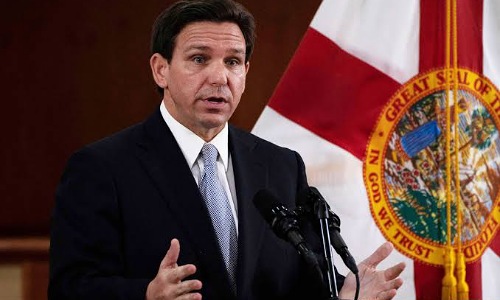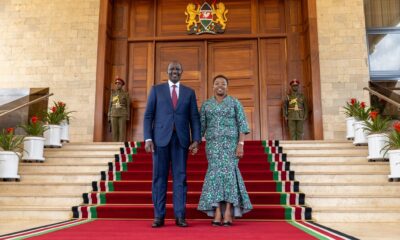International News
US State Bans Under-14 Children From Social Media

Florida Governor, Ron DeSantis made headlines on Monday by signing into law a groundbreaking bill targeting social media use among minors.
Under the new legislation, children under the age of 14 are barred from accessing social media platforms within the state while those aged 14 or 15 will need parental consent to create accounts.
Dubbed HB3, the law also mandates social media companies to promptly delete accounts held by users under 14 or face potential lawsuits.
Non-compliant companies risk legal repercussions, facing potential lawsuits filed on behalf of underage users who create accounts on their platforms.
As stipulated in the bill, minors could be entitled to receive damages of up to $10,000 for any infractions.
Companies found to be in breach of the law could face substantial penalties of up to $50,000 per violation, in addition to covering attorney’s fees and court costs.
Speaking at the bill-signing ceremony, Governor DeSantis emphasized the legislation’s goal of assisting parents in navigating the complex landscape of raising children in today’s digital age.
Notably, DeSantis had previously vetoed a stricter iteration of the bill, which proposed banning social media accounts for minors under 16 and required Florida residents to provide identification to join social media platforms.
Set to take effect in January 2025, HB3 emerges amidst a growing push for social media regulation nationwide.
Parents’ concerns about the platforms’ insufficient safety measures for children have fueled this momentum.
In December, over 200 organizations rallied behind the Kids Online Safety Act (KOSA), urging Senate Majority Leader Chuck Schumer to fast-track a vote.
KOSA aims to hold apps and online platforms accountable by establishing liability, or a “duty of care,” for content recommendations that could detrimentally impact minors’ mental health.
In January, lawmakers subjected CEOs from TikTok, X, and Meta to rigorous questioning regarding online child safety.
Despite facing scrutiny, the tech executives reiterated their dedication to child safety and highlighted the array of tools they provide as evidence of their proactive approach to combatting online exploitation.
Florida House Speaker Paul Renner and other proponents of the new legislation contend that social media usage poses risks to children’s mental well-being and facilitates communication between minors and sexual predators.
Renner emphasized the importance of active involvement in addressing social media’s impact, stating, “None of us can afford to be on the sidelines when it comes to social media,” during the bill signing.
NetChoice LLC, a coalition representing prominent social media platforms such as Meta, Google, and X, has challenged laws in several states, like Ohio and Arkansas, aimed at restricting teenage social media access.
Similarly, Florida’s legislation is anticipated to encounter legal hurdles, particularly concerning assertions of First Amendment violations.
Carl Szabo, vice president and general counsel for NetChoice, expressed disappointment in Governor DeSantis’s decision to endorse the legislation, labeling it as “unconstitutional” in an email statement.
Szabo emphasized that there are alternative methods to ensure online safety for Floridians and their families without infringing upon their freedoms.
Both Governor DeSantis and Speaker Renner acknowledged the anticipated legal challenges in their remarks.
Renner emphasized the bill’s commitment to upholding the First Amendment, stating, “You will not find a line in this bill that addresses good speech or bad speech because that would violate the First Amendment.
“We’ve not addressed that at all. What we have addressed is the addictive features that are at the heart of why children stay on these platforms for hours and hours on end.”
DeSantis addressed NetChoice directly, asserting, “We’re going to beat them, and we’re never ever going to stop.”
He maintained that the bill is constitutionally sound, emphasizing its adherence to constitutional principles.
DeSantis reaffirmed his commitment to constitutional principles, stating, “Any time I see a bill, if I don’t think it’s constitutional, I veto it.”
He characterized the bill as “a fair application of the law and Constitution,” highlighting its alignment with constitutional standards.
International News
ICC Issues Arrest Warrants For Israeli Prime Minister Netanyahu, Others
The International Criminal Court (ICC) has taken a historic step, issuing arrest warrants for Israeli Prime Minister Benjamin Netanyahu and former Defense Minister Yoav Gallant.
The charges include crimes against humanity and war crimes allegedly committed during Israel’s recent assault on Gaza.
In a detailed statement, the ICC accused the Israeli leaders of “intentionally and knowingly depriving the civilian population in Gaza of objects indispensable to their survival, including food, water, and medicine and medical supplies, as well as fuel and electricity.”
READ MORE: Osun Govt Decries Attempted Murder Of Park Mgt Chairman By Police
The ICC’s move marks a significant escalation in international scrutiny of the Israeli-Palestinian conflict. Netanyahu and Gallant are alleged to have orchestrated policies that caused severe harm to the civilian population in Gaza, leading to widespread condemnation from human rights organizations.
Alongside the charges against Israeli officials, the ICC also issued an arrest warrant for Hamas military commander Mohammed Deif. Deif has long been a central figure in Hamas’s military operations. Israel’s military claims to have killed him in a July airstrike, although this has not been independently verified.
The warrants highlight growing calls for accountability amid the ongoing conflict in the region. The ICC’s actions are likely to provoke heated debate and may complicate diplomatic efforts aimed at resolving the crisis.
With the warrants issued, global attention now turns to how the international community will respond and whether any practical steps will be taken to enforce them.
International News
COP29: Climate Summit Faces Deadlock Over Vague Funding Proposals For Vulnerable Nations
As the 29th United Nations Climate Change Summit (COP29) nears its conclusion, tensions are rising over a newly published funding proposal aimed at assisting developing nations in addressing climate-induced crises.
The proposal, released by the United Nations Framework Convention on Climate Change (UNFCCC) on Thursday, has sparked widespread debate among delegations, activists, and observers at the summit.
The document, spanning ten pages, outlines funding options to support developing countries in implementing their Nationally Determined Contributions (NDCs) under the 2015 Paris Agreement.
READ ALSO: Osun Explains N75,000 New Minimum Wage
However, it fails to specify how much wealthier nations are required to contribute annually—a key sticking point that has drawn criticism from the Global South and climate advocates.
Ambiguity in Funding Commitments
Critics argue that the absence of concrete figures undermines the credibility of the proposed framework.
Mohamed Adow, Founder and Director of Power Shift Africa, described the proposal as “a blank piece of paper,” highlighting the lack of clarity on financial commitments.
“This is the ‘finance COP.’ We came here to talk about money. The way you measure money is with numbers. We need a cheque, but all we have right now is a blank piece of paper,” Adow remarked during an interview.
The Global South, led by African delegations, is demanding at least $1.3 trillion annually by the end of the decade to adapt to climate change impacts and transition to sustainable energy systems.
Yet, developed nations have yet to commit to a specific annual figure, raising concerns over the summit’s ability to deliver tangible outcomes.
Key Provisions and Concerns
The new text acknowledges the disproportionate impact of climate change on developing nations and the financial barriers they face, including high costs of capital and limited fiscal space.
READ ALSO: NNPCL Launches Utapate Crude Oil Blend, Eyes Production Expansion In 2025
It proposes the establishment of a New Collective Quantified Goal (NCQG) for climate finance, suggesting a framework of “at least USD [X] trillion annually” from 2025 to 2035.
However, the absence of defined numbers has led to frustration among negotiators.
David Tong, Global Industry Campaign Manager at Oil Change International, emphasized the critical role of finance in achieving meaningful progress.
“Without finance, there is no phase-out [of fossil fuels], no energy transition, no adaptation. The ambitious options are simply missing,” Tong stated during a press briefing.
Rising Frustration from the Global South
Delegates from the Global South have expressed dissatisfaction with what they perceive as weak commitments from developed nations.
Many fear that without concrete financial pledges, the summit’s outcomes may fall short of expectations.
“This summit is about delivering justice to those who suffer most from climate impacts. Wealthy nations must step up and provide the necessary funding,” said an African negotiator, speaking on condition of anonymity.
A Critical Juncture
With less than 48 hours remaining in the summit, the stakes are high. The COP29 negotiations in Baku, dubbed the “finance COP,” are expected to set a precedent for addressing the financial needs of vulnerable nations.
Delegates are calling on world leaders to finalize an ambitious NCQG target and bridge the growing divide between developed and developing nations.
International News
Biden Approves Anti-Personnel Mines For Ukraine
In a significant policy move, U.S. President Joe Biden has authorised the transfer of anti-personnel mines to Ukraine, signaling heightened support for the country amid its ongoing struggle against Russian forces.
The decision underscores the administration’s commitment to bolstering Ukraine’s defensive capabilities as the conflict shows no signs of abating.
This announcement follows reports that Ukrainian forces have employed U.S.-supplied ATACMS missiles to conduct precision strikes within Russian territory.
These developments have reportedly prompted Russian President Vladimir Putin to modify elements of Russia’s nuclear doctrine, further intensifying global scrutiny of the conflict’s escalation.
READ MORE: Vinicius Jr. Honors Cameroonian Roots Ahead Of Brazil’s Clash With Uruguay
In addition to the mines, the U.S. is set to unveil a new $275 million military aid package for Ukraine in the coming days. The package is expected to include a range of munitions and equipment aimed at enhancing Ukraine’s operational readiness.
This move aligns with Washington’s broader strategy to maintain robust support for Kyiv, even as questions loom over potential shifts in U.S. foreign policy with the approaching transition to a new administration.
The U.S. government has remained steadfast in its support for Ukraine, with officials emphasizing that these measures are essential for helping Ukraine defend its sovereignty. The provision of anti-personnel mines, however, marks a controversial step, reflecting the urgency of the situation on the ground.
As the conflict continues, the Biden administration’s decisions will likely have profound implications not only for Ukraine but also for the broader geopolitical landscape, where tensions remain high and outcomes uncertain.













